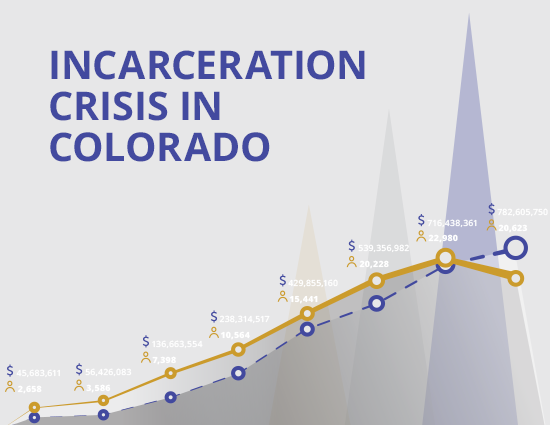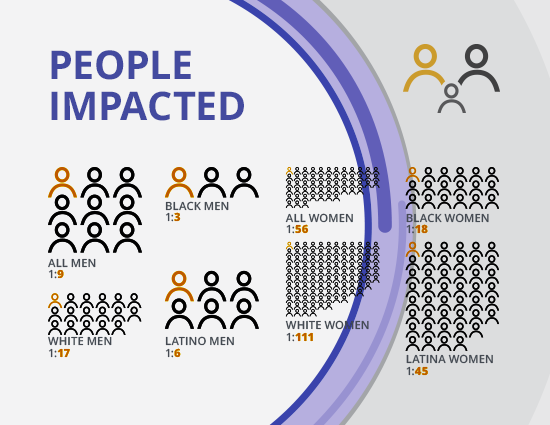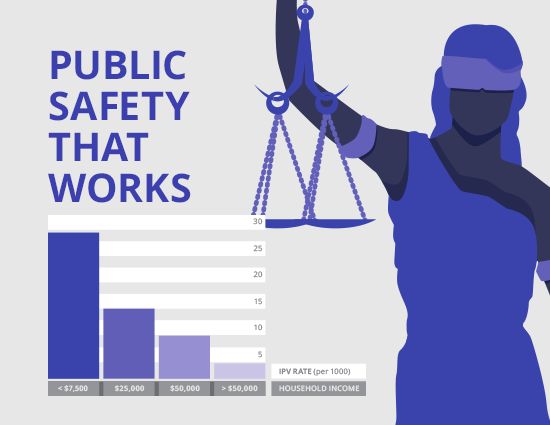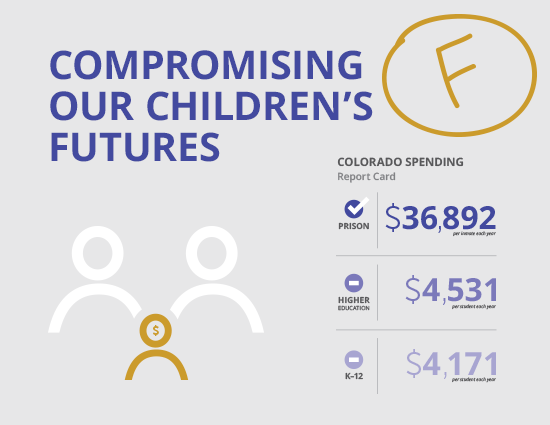Did You Know?
CCJRC’s work is grounded in research and people’s real experiences. CCJRC is available to be a resource for community organizations, policymakers, students and anyone else who wants to be deeply informed about statistics, budgets, criminal justice policy and the intersection between the overuse of the criminal justice system and other impacts on education, healthcare, families, racial disparity, collateral consequences of a criminal conviction and many other topics.
Sign up for our newsletter to receive Action Alerts, Upcoming Events and Important News.

Incarceration Crisis in Colorado
Over the past 35 years, the state prison budget has exploded by almost 1288% and we’ve seen an unprecedented growth in the prison population.

People Impacted
When you combine the closing of mental health facilities with a war on drugs, you get an enormous ripple effect across our communities.

Public Safety That Works
We’re often ignoring alternative strategies that do work to prevent crime. For example, research shows that higher levels of household income are associated with lower rates of intimate partner violence against women.

Compromising Our Children’s Futures
The unprecedented growth in prison spending is one of the reasons that Colorado ranks at the bottom of states for public investment in education.
Reports, Research and Newsletters

Sign up for our newsletter to receive Action Alerts, Upcoming Events and Important News.
Past newsletter editions can be requested at info@ccjrc.org
- Summer 2025 [PDF]
- Spring 2025 [PDF]
- Winter 2024 [PDF]
- Fall 2024 [PDF]
- Summer 2024 [PDF]
- Spring 2024 [PDF]
- Winter 2023 [PDF]
- Fall 2023 [PDF]
- Spring 2023 [PDF]
- Spring 2023 [PDF]
- Winter 2022 [PDF]
- Spring 2022 [PDF]
- Winter 2021 [PDF]
- Summer 2021 [PDF]
- Winter 2020 [PDF]
- Summer 2020 [PDF]
- Winter 2019 [PDF]
- Spring 2019 [PDF]
- Winter 2018 [PDF]
- WAGEES Special Edition Fall 2018 [PDF]
- 2018 Spring [PDF]
- 2017 Winter [PDF]
- 2017 Spring [PDF]
- 2016 Winter [PDF]
- 2016 Summer [PDF]
- 2016 Spring [PDF]
- 2015 Winter [PDF]
- 2015 Summer [PDF]
- 2015 Spring [PDF]
- 2014 Winter [PDF]
- 2014 Summer [PDF]
- 2014 Spring [PDF]
- 2013 Winter [PDF]
- 2013 Summer (PDF)
- 2013 Spring [PDF]
CCJRC Statement on Denver Mayor Johnson’s Veto of the needle Exchange Ordinance
The Colorado Criminal Justice Reform Coalition is deeply disappointed in Mayor Mike Johnston’s choice to veto Ordnance 24-1791, a critical measure that would have removed restrictions on lifesaving Syringe Service Providers (SSP’s) in Denver. Click the link above to read the statement that CCJRC issued.
CCJRC Responds to CPR Coverage of Caring For Denver Grant & Grantees
Read the letter from our Executive Director, Christie Donner, along with messages from grant program participants, regarding Colorado Public Radio recent negative coverage of Caring For Denver Foundation and its community grantees (Article 1 & Article 2). This reporting is inaccurate and misleading, and we hope to give you a very different perspective from our years of experience working closely with Caring For Denver and many of the worthy community organizations it funds.
Overdose Prevention Centers – Special Brief – February 2023
For the past 20 years, overdose deaths have dramatically increased in Colorado. While the state has tried to reduce overdose rates, one effective strategy that has not been utilized is for the state to give local control to cities that want to develop Overdose Prevention Centers (OPC). This brief will illustrate what OPC are, the need and history of OPC in Colorado, why they are essential to saving lives and how allowing local control to operate an OPC in Colorado is critical given the high rates of overdoses Coloradans are experiencing every day.
Simple Drug Possession Opinion Polls – April 2022
As Legislature Prepares to Consider Fentanyl Bill, Poll Finds Most Colorado Voters Oppose Increasing Penalty for Simple Drug Possession. Law enforcement officials’ calls to re-felonize drug possession are not widely supported by the community; more than half of Colorado voters have a close family member or friend who has experienced addiction, and about three out of four votes think the state should focus more on prevention and treatment and less on punishment and incarceration. See below for links to the full results of the statewide survey and additional citywide surveys conducted in Denver and Aurora.
- Colorado Results April 2022 [PDF]
- Denver Results April 2022 [PDF]
- Aurora Results April 2022 [PDF]
Fentanyl in Colorado – Special Brief – March 2022 [PDF]
Fentanyl overdose deaths have dramatically increased across the U.S. since 2014, including in Colorado. As state lawmakers work to address the crisis, the public dialogue in the Capitol and the media has revealed a significant level of misunderstanding about fentanyl, the causes of the recent increase in overdose deaths, and how to effectively respond to it. More concerningly,some have proposed reverting to failed drug policies of the past that had little to no success of preventing overdoses, reducing drug use, disrupting the drug supply, or preventing additional harms. This brief illustrates how Colorado got here and what it can do to address this public health emergency.
Coalition Letter to the Colorado General Assembly Regarding Drug Possession Penalties – March 2022 [PDF]
On behalf of the more than 60 undersigned organizations, we are writing to urge you to oppose making simple drug possession a felony. We agree that bold action must be taken to address the overdose crisis. But we do not believe people with an addiction should be made felons for simple
drug possession, and polls show most Coloradans (and most Americans) agree.
Joint Letter to Colorado’s Independent Congressional & Legislative Redistricting Commission – July 2021 [PDF]
Civil Rights organization request for adoption of policy to require redistricting population data to reflect incarcerated people at their residential addresses rather than their place of incarceration.
CCJRC Memo to Colorado’s Independent Congressional & Legislative Redistricting Commission – July 2021 [PDF]
Support for adoption of policy to require redistricting population data to reflect incarcerated people at their residential addresses rather than their place of incarceration.
CCJRC Special Report – Community Corrections Outcomes in Colorado Demonstrate Need for a New Approach – April 2021 [PDF]
Findings suggest deep structural changes are needed to reduce recidivism, promote public safety and improve the return on the state’s significant annual investment in community corrections
CCJRC Open Letter to Mayor Hancock, DPD Chief Pazen, and Governor Polis – June 3, 2020
Night after night civil rights marchers and others have been confronted by riot-geared police firing tear gas, rubber bullets, foam bullets and explosive devices while you, Governor Polis and Mayor Hancock, escalated this outrageous and excessive use of force by calling in the National Guard. Read the full letter
Coalition requests Governor to take immediate action to address COVID-19 in Colorado’s prisons – May 8, 2020 [PDF]
CCJRC joined several organizations calling on Governor Polis to use his executive authority and clemency powers to protect the most vulnerable people in Colorado prisons. As the risks of COVID -19 continue to climb, the measures taken thus far have not been enough to protect the lives of elderly and medically compromised people in prisons, correctional staff and the community at large.
Request for immediate action to address COVID-19 in Colorado’s jails and prisons – March 17, 2020 [PDF]
CCJRC joined several other organizations to call on Governor Polis, State Court Administrator Vasconcellos, and Chief Justice Coats, as well as the Colorado Department of Corrections, the Colorado Parole Board and the Colorado Department of Safety, to take immediate action to protect the lives of vulnerable inmates, guards, correctional and court staff, attorneys, probation officers, parole officers, their families and the public from the inevitable community spread of COVID-19.
Most Coloradans oppose Idaho’s plan to transfer inmates to live in one of Colorado’s closed private prisons, and a strong majority would support the Legislature prohibiting private prisons from housing other states’ inmates, according to results of a statewide poll released Tuesday, Feb. 4, 2020.
CCJRC Prison Budget Drug Felony Report: Jan 2019 [PDF]
Drug felony filings continue to increase in Colorado, driving up state prison budget. With prisons nearly full and the Department of Corrections budget closing in on $1 billion, most Coloradans want the state to seek alternatives to incarceration — including reducing the penalties for simple drug possession.
CCJRC-ACLU Memo in Opposition to Prison Expansion: Dec 2018 [PDF]
After decades of unprecedented growth, the Colorado prison population declined dramatically from 2010-2013 as a result of intentional efforts by legislators, criminal justice agencies, and the Colorado Commission on Criminal and Juvenile Justice. Colorado was not alone, as states across the country embarked on their own efforts to reign in burgeoning prison populations and budgets.
Voting with Conviction Special Report: Oct 2018 [PDF]
Most people with criminal records are eligible to vote in Colorado. Unfortunately, this is not widely known. According to a survey commissioned by the Colorado Criminal Justice Reform Coalition, there is significant public confusion surrounding the voting rights of individuals currently involved in the justice system.
Victims Speak: April 2018 [PDF]
CCJRC in conjunction with the Public Polling Policy institute surveyed 500 crime survivors of crime in the Denver metro area, with an oversampling of victims of color to better understand the needs and policy preferences of survivors. The results were published in April of 2018, and one of the most profound findings was the lack of community-based support services, particularly for men, people of color, and young adults.
CCJRC Special Report on Drug Felony Filing: March 2018 [PDF]
$1 Billion Prison Budget Looms for Colorado. A surge in drug felony filings — mostly for simple possession — is driving demand for prison beds and having a disproportionate impact on women.
- 2020 CCJRC Annual Report[PDF]
- 2019 CCJRC Annual Report [PDF]
- 2018 CCJRC Annual Report [PDF]
- 2017 CCJRC Annual Report [PDF]
- 2016 CCJRC Annual Report [PDF]
2015 CCJRC Annual Report [PDF]
2014 Edition
This publication attempts to document the true impact of a criminal conviction in Colorado. It contains consequences that arise under Colorado law, yet are not included in the sentence imposed by a judge at the conclusion of a criminal case. The goal of this work is to provide all participants in the criminal justice system a more accurate understanding of how a conviction will impact the life of an accused person and, less directly, the community in which that person will ultimately live.
February, 2008
This report identifies and describes interventions that are effective in reducing recidivism and preventing crime. The primary audience is the Colorado Commission on Criminal and Juvenile Justice, and the primary goal of this compendium is to assist the Commission in carrying out its mission and statutory duties. These duties include investigating evidence-based recidivism reduction initiatives and cost effective crime prevention programs.
